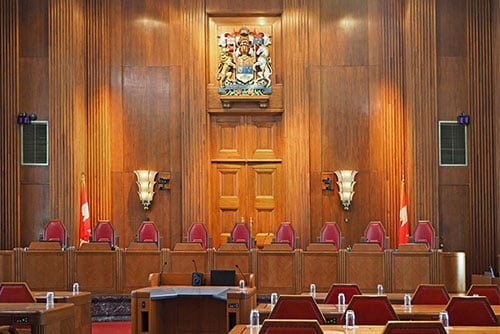
Jurisdiction of council to remove judge could head to Canada’s highest court

The Canadian Judicial Council says the Supreme Court of Canada should weigh in on when a federally-appointed judge can be removed from office.
The CJC, which is tasked with reviewing complaints against superior court judges, said on Aug. 15 it was seeking leave to appeal to the SCC in its longstanding dispute over Justice Michel Girouard.
“The issues raised by Council in the Appeal are constitutional in nature,” said the CJC in an announcement. “Council believes they are of national significance in that they relate directly to a key aspect of judicial independence, security of tenure. Judicial independence exists to protect the public, so that judges can render decisions impartially without fear of interference.”
After Girouard was appointed in 2010, a 2012 complaint alleged Girouard participated in a “transaction involving an illicit substance.” A video appeared to show Girouard, then a lawyer, in the transaction with a client, the complaint said. The CJC recommended to the Minister of Justice that Girouard be removed from the judicial post.
A 2014 inquiry “was unable to conclude that the exchange captured on video involved an illicit substance despite the fact that a majority of its members questioned the reliability and credibility of Justice Girouard’s testimony.”
Following years of sparring between the CJC and Girouard, Girouard applied for judicial review of the CJC’s recommendation. The CJC, in turn, filed a motion to strike the applications for judicial review in question, arguing the federal court did not have jurisdiction to hear the case under ss. 2 and 18 of the Federal Courts Act “since the Council is not a ‘federal board, commission or other tribunal.’”
Last year, Federal Court Justice Simon Noël released a decision, totalling more than 100 pages, writing that the CJC’s position was “peculiar.”
“It is undeniable that a report recommending the removal of a judge has a serious impact on that judge, professionally and personally, and on his or her family. It is inconceivable that a single body, with no independent supervision and beyond the reach of all judicial review, may decide a person’s fate on its own,” wrote Noël in 2018 FC 865.
A May 16 federal court decision dismissed an appeal, concluding the criteria for the admission of the new evidence were not met. The 2019 decision, Canada (Judicial Council) v. Girouard, 2019 FCA 148, said the council is considered a “federal board, commission or other tribunal” under the Federal Courts Act and does not exist “because of some inherent jurisdiction related to the judicial status of some of its members.”
Now, the CJC says it “seeks clarification” of whether its recommendations to remove judges “may be the subject of review and, if so, by whom.”
Seeking consideration of the nation’s highest court means that Chief Justice of Canada Richard Wagner, who is also CJC chair, must take “formal steps” recuse himself from any involvement in the case, the CJC’s announcement said. Wagner, who was previously a judge in Quebec and was elevated to lead the SCC in 2017, “does not participate in the review of any judicial conduct matter and has not taken part in the decisions regarding this matter,” said the council.
Wagner told The Canadian Press in March that he would be looking into reforming the internal management of the CJC and that “everything is on the table.”
“If the judge has to be removed, he has to be removed quickly and without too much cost to society …. We need reforms. Parliament should find a way to make sure that these matters don’t drag for too long and aren’t too expensive,” Wagner said this spring.
The CJC said in its Aug. 15 announcement that it will “continue to advocate for legislative reforms in relation to judicial conduct, to ensure that there is a new process that is transparent and achieves the necessary balance between a judge’s security of tenure and the need to remove from office those judges who are unable to uphold the high standards attached to that office.”
“A careful balance is necessary to ensure that inquiries into judicial conduct are both fair to the judge and fair to the public interest,” the CJC’s announcement said. “The ultimate goal of the process of review of the conduct of judges is to foster ongoing public confidence in the judiciary.”